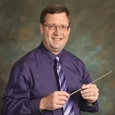Every now and then a student will exit the band room with an “I love you, Mr. Reely!” echoing in their wake. I answer in kind with a warm-hearted “I love you, too,” but the response is tinged with a slight uneasiness. I’m just not comfortable saying it at school even though at my age I qualify as a father figure. I really do love them, warts and all, and sometimes I wonder if I should express this love to them more openly. But when I reflect on my formative days, I only remember one director saying that she loved us and that was by way of dedicating Olivia Newton John’s “I Honestly Love You” to my junior high band right before we played it. Despite this, I knew which directors really cared. Should I break away from my past and voice my feelings or just let my actions speak for themselves?
While in a bookstore perusing books for my grandson, I found a happy option when I ran across When a Grandpa Says “I Love You” by Douglas Wood. It relates how grandfathers don’t always say “I love you” in a regular way, but through various things that they do, whether it’s showing the grandchild how to tie shoes or how to throw a pitch, or just taking the time to sit at a tea party. After reading the book, I thought that it fit my feelings perfectly. So I decided to adapt the text and give it to my students for Valentine’s Day.
When a band director says, “I love you,” he doesn’t say it in the regular way.
Instead, he might say something like, “Don’t forget your flute lesson after school today.” Even though you didn’t practice much before the last one, and he knew it.
Sometimes a band director says “I love you” by getting the stuck mouthpiece out of your trumpet – just like he did the day before.
A band director can say “I love you” by trimming your reed, smiling and nodding after your solo, or playing duets with you.
He can say it by listening to you play scales. (Yes, scales!) And by patiently listening to you jam on your favorite song at full volume for the hundredth time when he would rather you practice something else.
He might say “I love you” by teaching you a solo on a Friday afternoon, and by standing outside your room at solo and ensemble competition to hear how you did.
A band director can say “I love you” by explaining something five different ways to find the one that makes things clear to you.
Or by telling you a corny joke. Again.
Sometimes a band director says “I love you” by giving you a hard “talking to” – and then by giving you a second chance.
He might pat you on the back. Jab you in the arm. Or give you a fist bump.
Or maybe he’ll say it by saying how proud he is of you. Or he might just call you a knucklehead.
A band director can say “I love you” by saying “one more time” and then doing it three more times. (Okay. Maybe not.)
But most of all, a band director says I love you just by being your band director.
The message is much the same in a tender scene from the musical Fiddler on the Roof. A contemplative Tevye, who first laid eyes on his wife Golde on their wedding day, asks her if she loves him. She ultimately responds that she has lived with him, fought with him, and starved with him for 25 years and that “if that isn’t love, what is?” I believe we can express similar sentiments when considering all the things we do for our students. After I give my students the valentine, they, like the Tevye and Golde, might decide that “it doesn’t change a thing, but it’s nice to know.”






